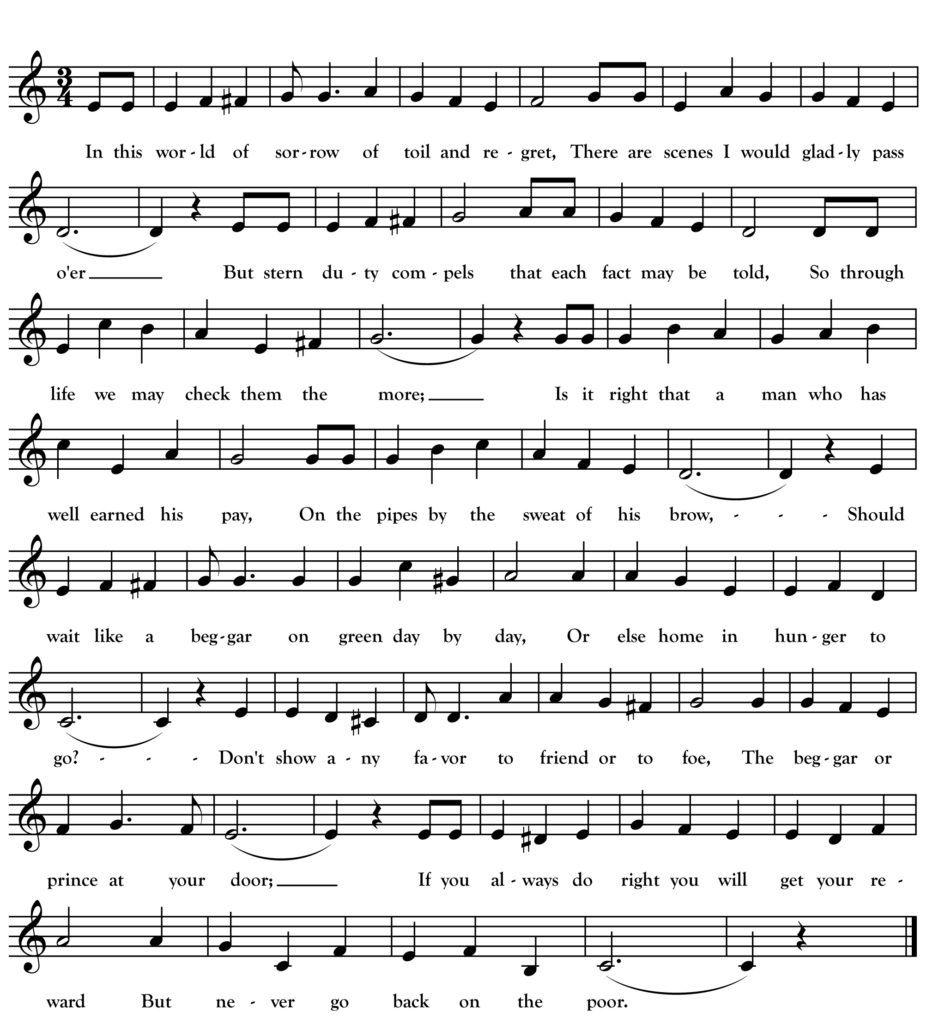Never Go Back on the Poor

In this world of sorrow, of toil and regret, there are scenes I would gladly pass o’er,
But stern duty compels that each fact must be told, so through life we may check them the more;
Is it right that a man who has well earned his pay, on the pipes by the sweat of his brow,
Should wait like a beggar on green day by day, or else home in hunger to go?
Don’t show any favor to friend or to foe, the beggar or prince at your door;
If you always do right you will get your reward, but never go back on the poor.
From the wild waste of waters there came a death cry, as dashed on an iron bound shore,
A noble ship struck in the darkness of night, and sank midst the tempest’s loud roar;
The captain asleep and the men of their post, with the coal and provision run short,
While the doomed ones they hoped for that bright Western land, which in sweet joyous dreams they had sought.
Can it be such neglect shall by us be forgot, or that money will triumph once more?
A good, willing hand, a stout branch and a rope, for those who go back on the poor!
When the divers went down ’neath the wreck for to search, for the bodies that lay far below,
“It’s nothing but a steerage,” was oft the remark, as a ghastly corpse came up to view;
As if only a steerage could shut out a soul, because poverty claimed him her own,
As if dollars and dimes was the source of all worth, and the road to all good that is known.
But the white star must change her color aloft, to blood red afloat and ashore,
Till the steamer Atlantic is forgotten by time, with her cargo of unburied poor.
This month we have another song from the repertoire of Irish-Minnesotan Michael Dean. The song itself is fairly obscure but its moral is one found with some frequency in Dean’s Flying Cloud songster. The 1922 book contains several songs encouraging sympathy for the plight of the poor, wayward and elderly. These include expressions of working class grief like “The Tramp’s Lament” and “The Long Shoreman’s Strike” and the tear jerking “She May Have Seen Better Days” about a girl huddled on the street in a big city who “was once someone’s joy, cast aside like a toy.” Dean also sang three songs specifically about elderly people cast out by their families to live out their days in the county almshouse: “Just Tell Them That You Saw Me,” “I Told Them That I Saw You” (a response to the former) and “Over the Hills to the Poor House.” Another song, “Jim Fisk,” includes the same repeating admonition to “never go back on the poor” that appears in this month’s song. Of all these, “Jim Fisk” seems to have been the most popular across the north woods. (The song is fascinating for its use of Fisk, a famous robber baron of the era, as an exemplar of ethical behavior—seemingly because he provided aid after the Great Chicago Fire and “did all his deeds, both the good and the bad, in the broad, open light of the day!”)
Sentimental songs advocating charity and mercy for the poor were common and popular on late 19th century music hall stages and in oral tradition. They may have had a special resonance for Dean who no doubt met many the wayward son as a saloonkeeper in logging era Minnesota. Dean also owned a farm east of Hinckley that he sold to Pine County in 1905 to establish the county’s first poor farm. Dean stayed on as the institution’s manager for two years where he, again, would have met characters reminiscent of these songs.
The text of “Never Go Back on the Poor” appears in Wehman’s song collection No. 11 published in 1886 with the note that it’s tune is that of “Don’t Put Your Foot on a Man When He’s Down.” I found sheet music for “Don’t Put Your Foot…” in the Lester Levy Sheet Music Collection online and adapted it to Dean’s words above. The central story to this song, again used to evoke charity, is the 1873 wreck of the White Star Line passenger steam ship Atlantic. The Atlantic sunk off the coast of Nova Scotia and inspired other songs as well.
